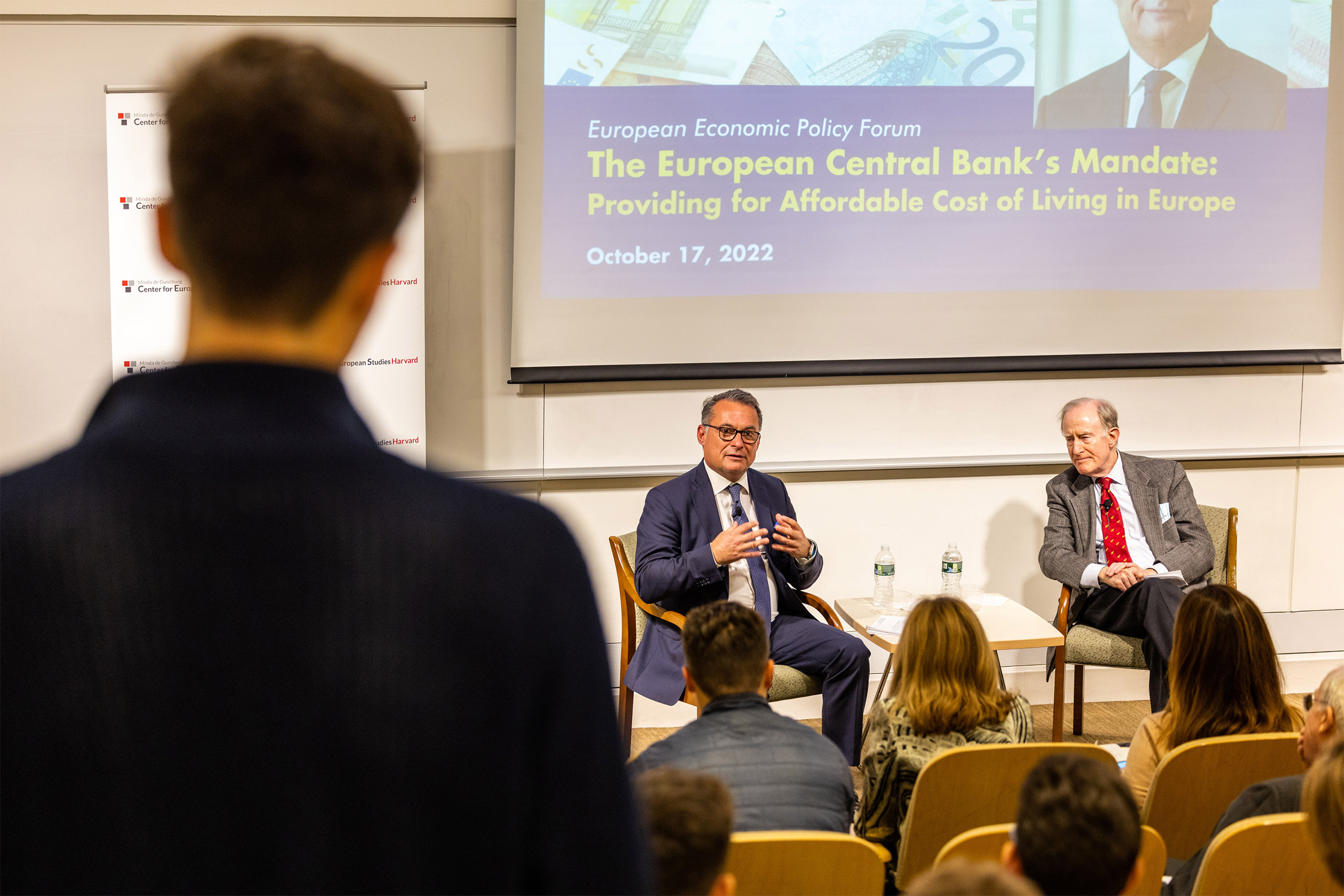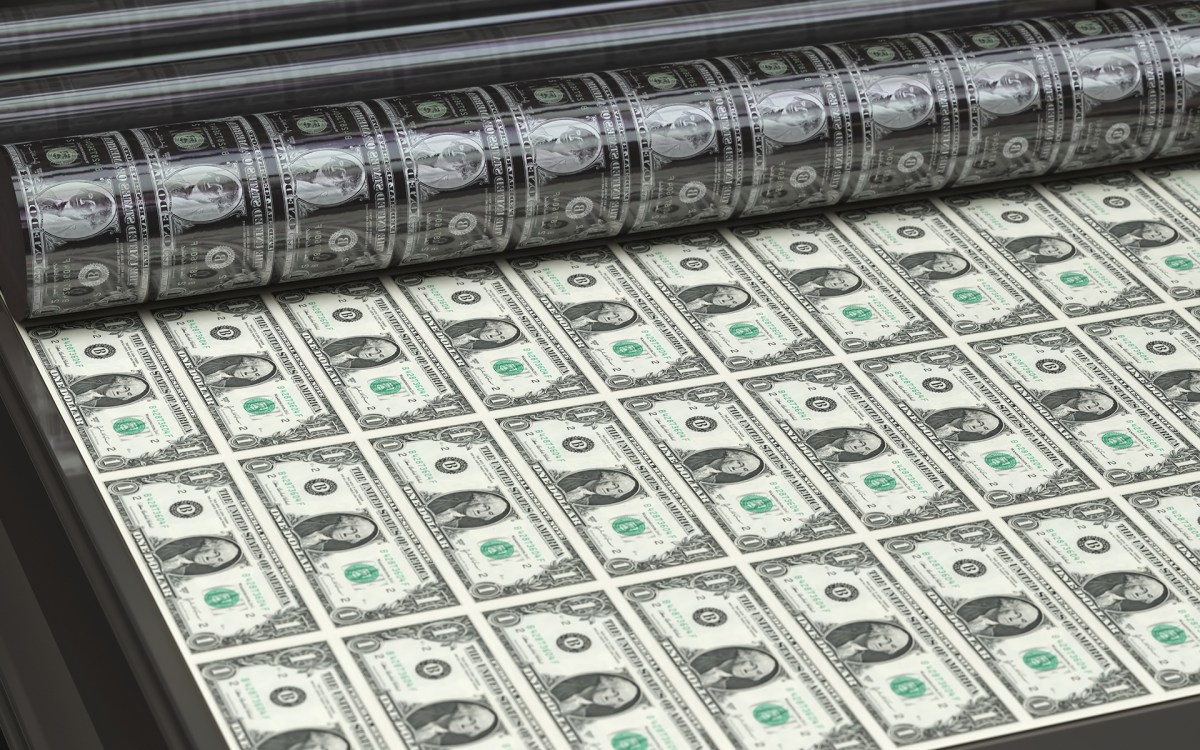
“In an uncertain world, no one wants to invest; no one wants to consume. So there is a high probability that the economic situation in Germany could deteriorate in the months ahead,” said Deutsche Bundesbank President Joachim Nagel (left), ahead of a talk with Harvard Professor Benjamin Friedman.
Photo by David Elmes © 2022
European Central Bank official sees long road ahead
Nagel says more rate hikes needed with inflation, energy costs surging amid Russian attack on Ukraine
Joachim Nagel, president of the Deutsche Bundesbank and member of the Governing Council of the European Central Bank (ECB), was at the Minda de Gunzburg Center for European Studies on Monday as part of the European Economic Forum. Before his discussion on the European Central Bank’s mandate with Benjamin Friedman, William Joseph Maier Professor of Political Economy, Nagel sat down with the Gazette to discuss the ECB’s economic policy and priorities. Interview was edited for length and clarity.
Q&A
Joachim Nagel
GAZETTE: You are just coming from the IMF-World Bank fall meetings. What were the main topics discussed?
NAGEL: The general assessment was pretty clear: The major economies are suffering from high inflation rates. We have to bring inflation down, and this is a job for the central banks. For the moment, and I say this for the Eurosystem, we have to hike rates further. Of course, we also have to be sensitive to the uncertainty this causes and that there is an increasing risk of financial stability issues. But our primary objective is clear — restoring price stability in the euro area.
GAZETTE: You started your mandate as president of Deutsche Bundesbank and member of the European Central Bank’s Governing Council in January of this year, and right from the beginning you emphasized the need to get inflation under control. Why?
NAGEL: It’s important here to give you some numbers to show the dimension of the problem. In the euro area, the inflation rate in September came in at 10 percent. And according to the latest ECB staff projection, inflation will average 8 percent this year. Our target is 2 percent in the medium term. Obviously, there’s a huge gap between 2 percent and 8 percent.
Inflation means that the purchasing power of wages, pensions, and other nominal income shrinks. High inflation is dampening growth and eroding wealth, with lower- and medium-income families suffering the most. So inflation has also a social dimension. The costs of inflation can be seen in Europe but also in other countries. That is why we all have to bring inflation down.
GAZETTE: Inflation has been rising since mid-2021, long before Russia’s invasion of Ukraine at the end of February 2022. What do you see as the main drivers?
NAGEL: One of the main drivers for Europe is this unprovoked war of aggression of Russia against Ukraine. Our economy was hit by a supply shock: Energy prices went up significantly. The price of gas is six or seven times higher than just 12 months ago. There is an urgent need to better balance supply and demand in European energy markets.
But you are right, even before the invasion, inflation was on the rise. One of the reasons was the pandemic. The supply of goods was constrained, while demand recovered rapidly. In my first speech I gave as the president of the Bundesbank in January, six weeks before this horrible war started, I addressed the risk that inflation could persist. I was aware that underlying pressures were building up. But nevertheless, we shouldn’t forget: The 24th of February was a game-changer which triggered a massive energy supply shock.
GAZETTE: What is your long-term perspective?
NAGEL: I do not have the famous crystal ball. There’s not a quick solution to really fix the situation or Russia stopping this war, and so it seems that there is more uncertainty coming. That uncertainty is clouding financial markets. In an uncertain world, no one wants to invest; no one wants to consume. So there is a high probability that the economic situation in Germany could deteriorate in the months ahead.
GAZETTE: What tools can the European Central Bank deploy to keep a lid on rising price levels?
NAGEL: Over the last crisis, we developed new instruments, such as asset-purchase programs that addressed the situation when inflation was too low. As a result of these asset purchases, the balance sheet of the Eurosystem — that is the ECB and the national central banks in the euro area — expanded considerably. But an important point here is that all that we are doing in monetary policy is related to our objective of maintaining price stability. This is our mandate — and not to shore up government finances in euro-area member states.
GAZETTE: What, and in what sequence, do you see the ECB doing to counter inflation?
NAGEL: First of all, what we are doing now is hiking interest rates. We did the first rate hike in July of 50 basis points; the second one in September was 75 basis points. And as long as inflation is still high, I believe we will have to go further. “The journey has just started,” Christine Lagarde, the president of the ECB, said in one of her latest press conferences. We are at the beginning of the journey, and it is not fixed where that journey might end. Another element of what we could do in the future is to decrease the size of our balance sheets because in the past, as I have just mentioned, the size of the balance sheets increased significantly.
GAZETTE: Given the stark decline in purchasing power, is there a question of the ECB’s credibility being threatened?
NAGEL: In a situation like this where people are concerned — where they are asking, “What does this mean for my personal future?” “Can I pay the next energy bill?” — an important point is to communicate clearly. We will do our job and bring inflation down. But communication alone is not enough. We also need to deliver on our commitment and take decisive action. This is the best approach for credibility.
GAZETTE: Would you talk about your forecast and/or expectations for the ECB and the European economy?
NAGEL: It will take some time to bring inflation down. We are at the beginning of a run that is something between a 100-meter sprint and a marathon. I’m convinced that we will get where we have to go. What the Bundesbank and the ECB have showed in the past is that we can do this, and it will be the same this time.





